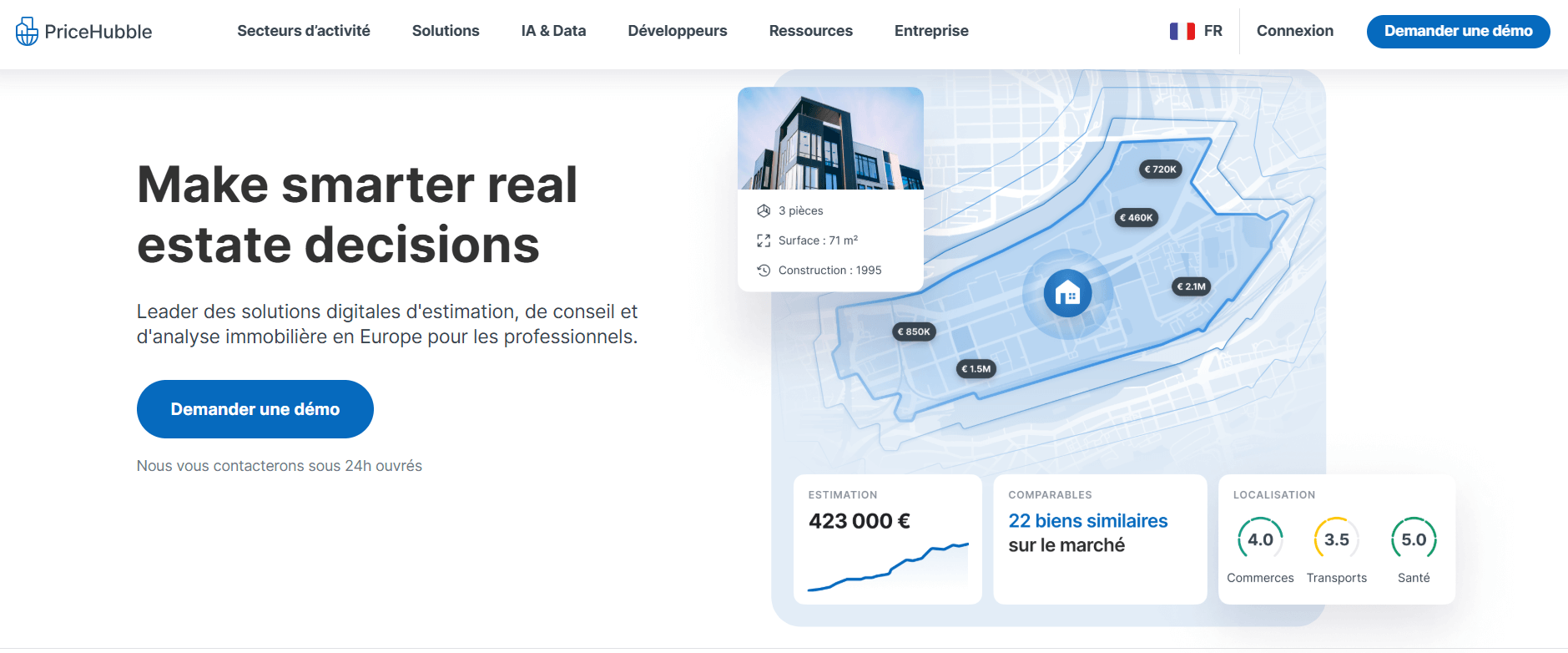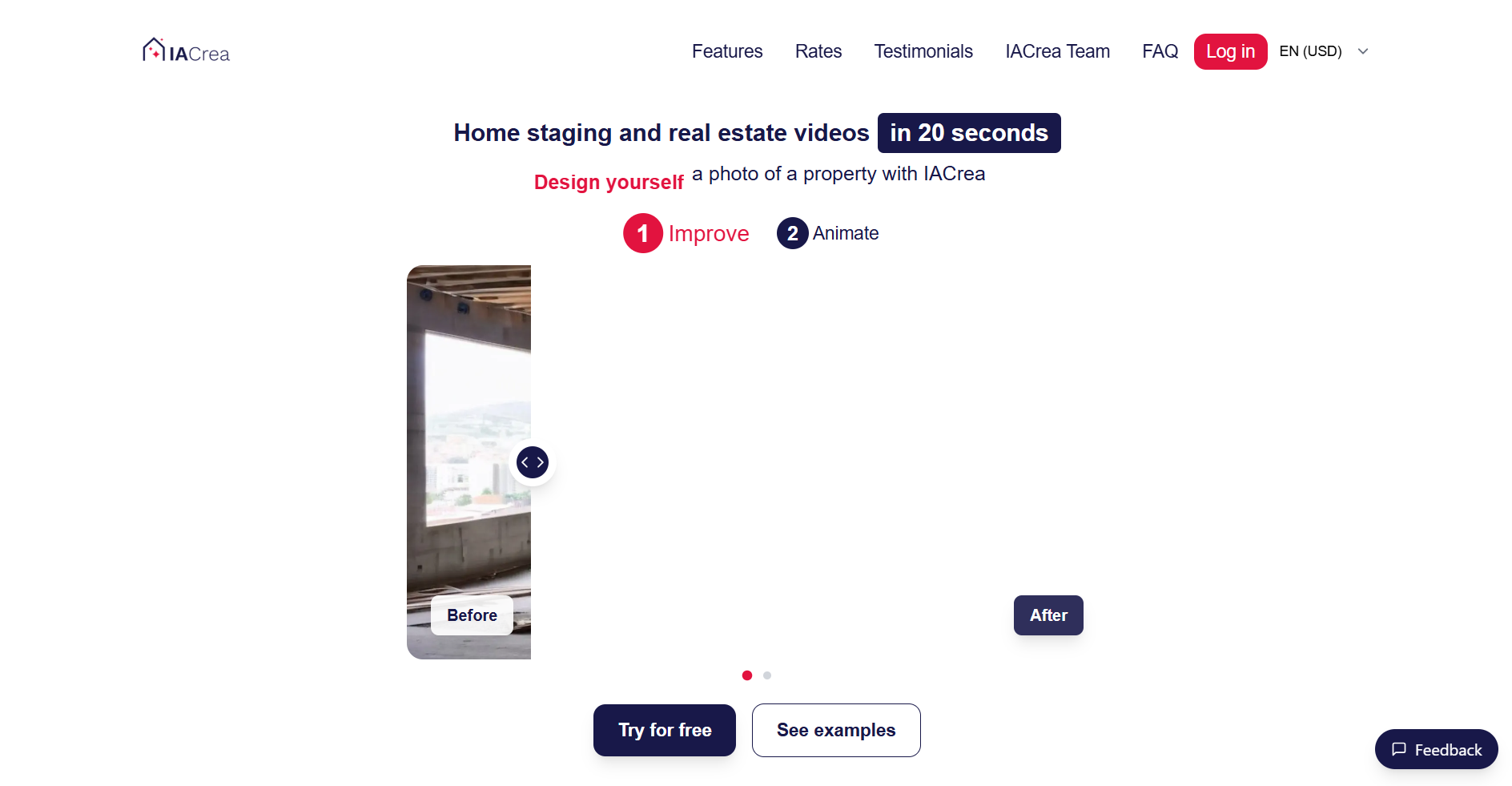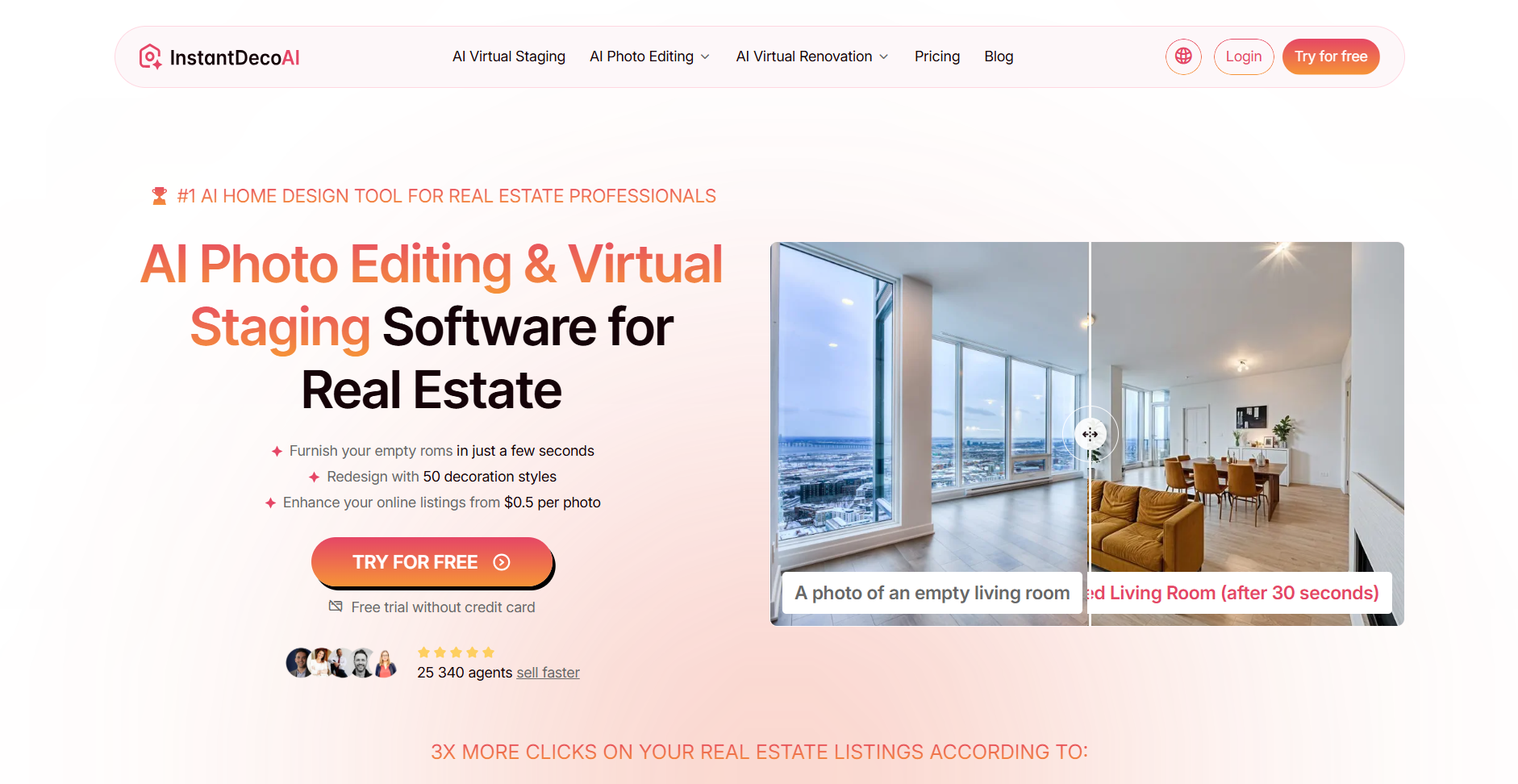The 5 best AI software programs for real estate agents in 2026
A real estate AI agent is an artificial intelligence–based tool designed to support estate agents and real-estate professionals. What are the best AI for real estate agents solutions?
Contact Us
A real estate AI agent automates time-consuming tasks such as writing listings, prospecting, or managing leads, while enriching the customer experience through interactive virtual tours and personalised recommendations.
Only 7% of companies in the real-estate sector are already using at least one AI technology. [4] The market is heating up, and these figures are expected to rise in the coming months and years. But as a real-estate professional, where do you stand?
How can you successfully integrate AI into your business?
Best AI for real estate agent tools
| Tool | Core function | Key benefit for agencies |
|---|---|---|
| Target First | AI conversational assistant, lead generation, customer support, etc. | Captures and qualifies prospects 24/7, reduces lead loss, answers common queries. |
| PriceHubble | Property valuation and appraisal | Precise, visual reports that strengthen credibility with clients |
| IACrea | Virtual home staging and visual content | Helps buyers picture themselves in the property; makes listings more attractive |
| InstantDecoAI | 3D visualisation and virtual layout | Immersive experience to sell better and remove buying barriers |
| ChatGPT | Writing and conversational assistant | Automates listings, emails, talking points, and client follow-ups |
1. Target First
Target First has established itself as a French reference for professionals who want to capture and qualify more leads without constantly mobilising their sales teams.
The solution is built on a fully customisable conversational assistant for the sector. In practical terms, a visitor browsing a listing in the evening or on a Sunday gets immediate, personalised answers to their questions.
The chatbot collects their contact details, assesses their level of interest, and, where relevant, forwards the contact to a human advisor. This ensures 24/7 service continuity, which significantly reduces lost prospects and ensures efficient handling of common requests.
For an agency, the value lies in automation as much as in analysis: a centralised dashboard tracks conversation performance in real time, measures conversion rates, and identifies the topics most frequently raised by potential buyers and owners.
2. PriceHubble

To convince a seller to grant a mandate, pricing arguments are decisive.
PriceHubble addresses this need with a property valuation engine powered by a vast amount of data: past transactions, socio-economic trends, local infrastructure, and demographic changes.
In seconds, agents can generate a detailed, visually appealing report customised to their agency's branding. These often interactive documents back up a pricing recommendation with concrete, verifiable elements, strengthening credibility with the client. For buyers, PriceHubble can also be used to compare different properties and refine their choices. The tool connects easily to real-estate CRMs, making it a natural ally for modern agencies.
3. IACrea

How a property is presented plays a decisive role in the purchase decision. IACrea understands this well, offering an AI-powered virtual home-staging solution.
From simple photos, the tool generates realistic visuals in seconds, showcasing the property in different decorative styles: modern, Scandinavian, minimalist, or high-end.
This helps buyers picture themselves far more easily and imagine their future home. The tool goes further by enabling the creation of promotional videos, enriching listings and giving them extra impact on portals or social networks.
For an agency, that means not only more attractive listings, but also a potentially shorter sales cycle, as properties attract more qualified viewings as soon as they go online.
4. InstantDecoAI

InstantDecoAI follows the same logic as virtual home staging but with an even more immersive approach. The tool transforms a standard photo into a fully interactive 3D model.
Prospects can visualise different layouts, change wall colours, reposition furniture, or test a complete makeover. For professionals, it's a way to remove one of the biggest buying barriers: the difficulty buyers have imagining themselves in an empty or poorly arranged space.
Agencies using InstantDecoAI
deliver a differentiated experience—close to a virtual tour but focused on interior design and space optimisation. This is a major advantage in a competitive market.
5. ChatGPT

Well known beyond real estate, ChatGPT can also become a valuable ally for agencies. Its main advantage is its versatility: it can generate compelling property listings, craft personalised follow-up emails, write neighbourhood descriptions, and provide talking scripts for negotiators.
Used alongside a CRM or a specialised chatbot, ChatGPT enriches client relationships and saves considerable time on content production.
Some agents even use it to prepare sales arguments tailored to the psychological profile of their prospects. Of course, the tool requires human oversight to ensure accuracy and authenticity, but it remains a powerful way to streamline repetitive tasks.
What is a real estate AI agent?
These tools can act autonomously to assist real-estate professionals in their day-to-day work. An agent is built on a continuous cycle—perception, reasoning, and action—allowing it to collect, analyse, and effectively leverage a wide range of data: client histories, CRM information, market listings, and sector trends.
Thanks to advanced AI technologies such as machine learning and natural language processing, an AI agent doesn't merely process information. It identifies business opportunities, anticipates client needs, and proposes decisions aligned with the agency's objectives. For example, it can:
- Automatically generate optimised property listings,
- Improve prospecting by targeting the right contacts,
- Organise immersive virtual tours to win over potential buyers.
At its core, two engines make all the difference: a contextual memory, which enriches each interaction based on the client's history, and a reasoning engine, which continuously refines its recommendations. This capacity for progressive learning turns the AI agent into a versatile partner that reduces repetitive workload and strengthens trust between estate agents and their clients.
AI and real estate: What are the benefits and impacts?
Integrating artificial intelligence into real estate marks a decisive turning point for agencies, developers, and brokers. Beyond simple automation, AI is redefining how professionals interact with clients, manage operations, and exploit available data.
Significant productivity gains
By delegating repetitive tasks—writing listings, following up with clients, qualifying leads, or scheduling viewings—a real estate AI agent frees up valuable time. Teams can focus on strategic missions: personalised support, negotiation, and long-term client loyalty.
Better market understanding
With predictive analytics, AI anticipates real-estate trends. It detects up-and-coming areas, estimates property values, and recommends the best go-to-market strategies. These insights—hard to process manually at scale—become accessible and actionable in real time. [1]
An enriched customer experience
A real-estate AI agent also transforms client relationships. Buyers benefit from personalised recommendations, real-time alerts for new listings, and immersive virtual tours that speed up decision-making. Sellers enjoy increased visibility and smoother follow-up. [2]
Strategic impacts on agency performance
At the organisational level, AI encourages better resource allocation and optimised portfolio management.
Agencies that integrate these tools typically see higher conversion rates, shorter transaction times, and sustained improvements in customer satisfaction. [3]
How to use AI for real estate in your business
| Key step | Objective | Concrete examples | Benefits for the agency |
|---|---|---|---|
| 1. Define priorities | Identify primary needs | Automate listing creation, generate more leads, reduce time spent on contact management | Better allocation of time and resources |
| 2. Choose the right tool | Select the AI solution for your use cases | Specialised content-generation tool, AI-enabled CRM, virtual-tour platform | Targeted investment and fast time-to-value |
| 3. Train your teams | Ensure smooth adoption | Training on ChatGPT, use-case demos, hands-on workshops | Staff engagement; reduced resistance to change |
| 4. Deploy gradually | Integrate AI step by step | Phase 1: automated listings; Phase 2: prospecting; Phase 3: client follow-up | Risk mitigation; progressive ramp-up |
| 5. Monitor and adjust | Measure performance and optimise | KPIs: handling time, conversion rate, customer satisfaction | Continuous improvement and measurable ROI |
💡Adopting a real-estate AI agent is not just installing software—it's a genuine transformation project that requires method and foresight. To get the most from it, here are a few key recommendations.
1. Set clear objectives
First, identify exactly what you expect from AI. Do you want to automate listing creation? Improve prospecting and lead qualification? Streamline client communications?
This step helps you scope the project and select the most relevant features.
2. Choose the right AI tools and partners
Not all AI agents are alike. Some specialise in real-estate content generation, others in predictive market analysis, or in customer-relationship management.
Compare several solutions, test their integrations with your tools (CRM, social networks, property-management software, messaging), and prioritise those that adapt to your specific needs.
3. Train your teams
Success largely depends on staff adoption. Even if AI is designed to simplify their work, a training phase is essential.
It explains concrete benefits, addresses any reservations, and ensures optimal daily use.
4. Start gradually
Rather than overhauling everything at once, it's often better to integrate AI step by step.
For example, begin with automated listings, then progressively expand to client follow-ups or market analysis. This approach reduces risk and eases onboarding.
5. Track and adjust regularly
AI learns continuously, but its effectiveness also depends on the monitoring you put in place.
Set performance indicators (number of qualified leads, reduced handling time, customer satisfaction) and adjust your practices to maximise results.
Typical use cases for a real-estate agency
Integrating a real-estate AI agent truly changes how agencies manage daily operations and steer long-term strategy. Here are a few concrete applications.
Automating listing creation
A key efficiency lever is content creation. AI automatically generates clear, attractive, SEO-optimised listings from the information stored in your CRM. This saves agents precious time and ensures editorial consistency across all channels.
Prospecting and lead qualification
A real-estate AI agent analyses data from website visits, forms, and ad campaigns to identify the most promising prospects.
It can then segment these leads and propose personalised follow-up scenarios.
👉 Concrete example: rather than calling 100 prospects, a salesperson focuses on the 15 profiles with the highest conversion potential, identified by AI using intent signals (clicks, interactions, search criteria).
Intelligent customer-relationship management
AI can quickly answer frequent questions (opening hours, availability, property information) via chatbots or voice assistants integrated into websites and social messaging.
It can also automatically remind clients about scheduled viewings or alert them when a new property matches their criteria.
Virtual tours and immersive guidance
By combining AI with virtual reality, agencies can offer interactive remote tours. The AI agent enriches the experience with contextual information (floor area, materials, estimated energy costs) and adapts to visitors' reactions.
For example, a couple searching for a home can “visit” three flats from their sofa, compare features, and receive a personalised shortlist—reducing unnecessary travel. [1]
Predictive analysis and go-to-market strategy
Beyond day-to-day operations, AI helps refine the agency's strategy. By cross-referencing market data with transaction history, it can recommend the best time to sell, adjust the price, or target the right distribution channels.
Combined, these use cases make the AI agent both an operational assistant and a strategic decision-support tool. It improves team responsiveness, shortens transaction times, and better aligns commercial strategy with market expectations.
Accelerate your agency's growth with AI
Integrating a real-estate AI agent is now a reality that is profoundly transforming how agencies work.
Beyond operational benefits, AI also affects strategic dimensions. It helps anticipate market trends, strengthen client relationships, and create a lasting competitive advantage in an increasingly digital and tight market.
To succeed with this transition and identify the solution best suited to your needs, it's advisable to rely on domain experts. The Target First teams support real-estate agencies in deploying and optimising their AI tools.
Our expertise ensures a smooth rollout aligned with your commercial and operational goals.
👉 Exploring the potential of real-estate AI can transform the way you work. Target First's experts are at your side to guide you through this evolution.
AI for real estate FAQ
Which AI agents are available for real estate?
There are several types of AI agents dedicated to real estate: some specialise in automatic listing creation, others in prospecting and lead management, and still others in appointment scheduling or predictive market analysis.
Depending on your needs, you can opt for an all-in-one solution (an intelligent CRM) or complementary tools integrated into your digital ecosystem (social networks, agency website, messaging).
How much does a real-estate AI agent cost?
Pricing varies by solution and features. Basic tools—like listing generation or automated appointment management—are often available from a few dozen euros per month.
More advanced solutions—with predictive analysis and full lead management—can cost several hundred euros per month, but they deliver a quick ROI thanks to productivity gains and higher conversion rates. A customised AI assistant for your real-estate needs, such as Target First, starts at $99/month.
Can you buy or rent a property through a real-estate AI agent?
A real-estate AI agent does not fully replace the human agent in a purchase or rental process.
However, it significantly streamlines the customer journey by suggesting properties that match the buyer's criteria, organising appointments, and supporting virtual visits.
Finalising a transaction remains the responsibility of a human estate agent, who safeguards the relationship of trust and ensures legal obligations are met.
Can a real-estate AI agent really replace a human agent?
AI is extremely helpful, but it doesn't replace the human aspect of the job. A real-estate AI agent automates repetitive tasks, provides analyses, and helps personalise client relationships.
However, negotiation, emotional support, and strategic decision-making remain the domain of human agents.
In reality, AI does not eliminate the role of estate agents; it transforms it—allowing them to focus on relational and commercial value.
Citations
- [1]https://creformaplus.fr/2025/07/16/les-methodes-destimation-immobiliere-en-2025-ia-data-locale-outils-connectes
- [2]https://www.flatsy.fr/blog/intelligence-artificielle-immobilier
- [3]https://www.morganstanley.com/insights/articles/ai-in-real-estate-2025
- [4]https://www.orange-business.com/fr/magazine/immobilier-comment-lintelligence-artificielle-va-revolutionner-secteur
Top 10 most read articles
